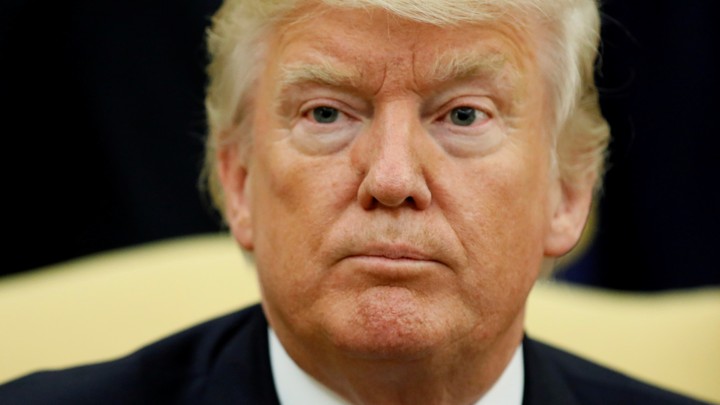Franklin Foer
 Ever since the earliest years of this century, Ukraine has been the contested frontier in a grand ideological struggle between the forces of democracy and kleptocracy.
Ever since the earliest years of this century, Ukraine has been the contested frontier in a grand ideological struggle between the forces of democracy and kleptocracy.
It was in Ukraine that Russia tested the misinformation tactics that it used in the American presidential election of 2016. And when Russia meddled in the U.S. campaign, one of its ultimate objectives was stunting American pressure to withdraw from the swaths of Ukraine that it illegally occupied.
Over the course of two revolutions, in 2004 and 2014, Ukrainians attempted to turn back the Russian-aligned oligarchs who have looted their country. And American presidents tried to bolster them. After the revolutionaries won power, the United States supplied rhetorical solidarity and aid. It prodded the new governments to resist the temptations of corruption and despotism.
With his reportedly extortive phone call to Ukrainian President Volodymyr Zelensky, Donald Trump didn’t just transgress American constitutional norms, meriting the impeachment inquiry that House Speaker Nancy Pelosi announced yesterday; he placed the United States on the side of kleptocracy in the Ukrainian struggle. If the news reports are true, he committed a crime that damages democracy beyond his nation’s borders.
Through the media, which they own, Ukrainian oligarchs portray their good-government foes as scam artists profiting from their supposedly idealistic crusades. Even the saints are terrible sinners, in their depiction. They hope to stall reform by inculcating broad cynicism in the public. This is precisely Trump’s strategy. Trump’s call to Zelensky was, it seems, part of an attempt to retain political power by depicting the entirety of Washington politics as a swamp. Because Trump’s corruption is his greatest electoral vulnerability, he intends to blunt that weakness by demonstrating that his leading Democratic opponent isn’t so different from himself.
But that opponent is in fact nothing like Trump’s depiction, representing as he does the now old-fashioned American commitment to democracy in Ukraine.
In 2015, Joe Biden, then vice president, ventured to Kiev to lend support to the fledgling revolution. A year earlier, protesters had occupied the Maidan, the city’s central plaza, protesting the thuggish rule of the pro-Russian president, Viktor Yanukovych. When police murdered 100 protesters, Yanukovych fled to Moscow and his government toppled. On the eve of Biden’s visit, however, there were good reasons to worry that the euphoria of the revolution had failed to dislodge the corrupt power structure.
The avuncular pep talk he delivered to the Rada, the Ukrainian parliament, was rousing, self-aware, blunt, and compassionate. In lyrical prose, he praised the murdered and insisted that the Ukrainian political class redeem their suffering: “This is your moment. This is your responsibility. Each of you—if you’ll forgive me for speaking to you this way in your body—each of you has an obligation to seize the opportunity that the sacrifices made in the Maidan.”
At the peak of peroration, Biden argued that democracy requires removing the “cancer of corruption.” This wasn’t a throwaway line. He made a detailed case against kleptocracy: “It siphons away resources from the people.” He urged the country to reform the judiciary in general and the office of the prosecutor general in particular. And in private, he was even more forceful. He said that if the country didn’t fire Viktor Shokin, the man who occupied that office, the United States wouldn’t guarantee essential loans.
Shokin represented the failure of the revolution. The reborn democracy was flailing because the country hadn’t punished and expunged representatives of the ancient regime. Ukraine never thoroughly investigated the atrocities committed against the protesters on the Maidan. The members of the political class connected to Yanukovych largely managed to escape without paying any price for looting the country, so they kept their fortunes and resumed their political meddling. In short, Shokin was the face of a culture of impunity.
The prosecutor general had turned a blind eye to the corrupt goings-on at Burisma Holdings, an energy company where Hunter Biden sat on the board, trying, perhaps, to trade on his family’s name. When the vice president called for the firing of Shokin, he was providing an important object lesson to the Ukrainians: Reforms must be pursued, even if the consequences will likely injure the material interests of close family. (And in his speech, he even had a line that could be read as an explicit assault on the company: “The energy sector needs to be competitive, ruled by market principles—not sweetheart deals.”)
By apparently proposing to trade arms for a politically motivated investigation of an opponent, Trump has stomped on that reformist message. He has reinforced the cynical impression that the rule of law is a ruse, undermining all the past American lectures about the value of waging war on corruption. The lecturing nation has shown itself to be just as dirty as the country it wags its finger at. This episode will understandably proliferate the sort of cynicism that undermines democratic culture.
Ukraine has held firm against Russian invaders, in the knowledge that the United States was backing the country, both militarily and politically. In the aftermath of the Trump call, it now must live with the anxiety that vital aid can be capriciously withheld. The firm support that bolstered its resistance now must feel disturbingly flimsy.
The abrupt turnabout—from Biden’s speech in the Rada to Trump’s phone call—is a dispiriting illustration of how quickly the United States has degraded its commitment to democracy and the fight against corruption. And as impeachment becomes a live possibility, Biden’s speech should be reread in this new context. Biden ended his address with a plea to members of the Ukrainian political class to risk their careers on behalf of the struggle against kleptocracy and despotism. “It may be your last moment. Please, for the sake of the rest of us, selfishly on my part, don’t waste it. Seize the opportunity.”
No comments:
Post a Comment